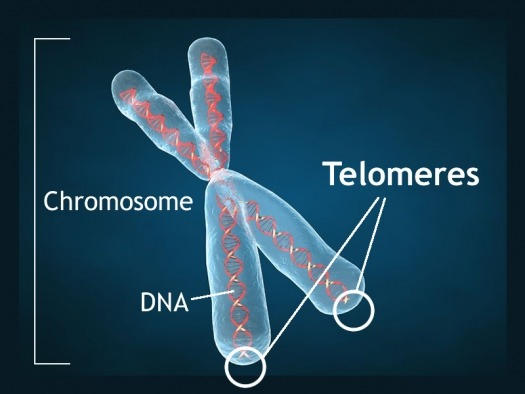
A telomere is a region of repetitive nucleotide sequences associated with specialized proteins at the ends of linear chromosomes. Telomeres are a widespread genetic feature most commonly found in eukaryotes. In most, if not all species possessing them, they protect the terminal regions of chromosomal DNA from progressive degradation and ensure the integrity of linear chromosomes by preventing DNA repair systems from mistaking the very ends of the DNA strand for a double-strand break.
Telomere shortening is associated with aging, mortality, and aging-related diseases. Based upon comparison between individuals of different ages, telomere length is negatively associated with the number of cell divisions in germ and tumor cells. This leads to the link between age and telomere length, as one might expect, the older an individual is the more times their cells have replicated their genome and divided. In contrast to humans, mice have been demonstrated to have significantly longer telomeres. This could demonstrate how the effects of telomere shortening might have a different or no effect on other eukaryotes, as the older mice had no significant difference in telomere length than younger mice. Furthermore, the role and importance of telomeres appears to have varying degrees of importance among model organisms. Common model organisms such as mice, S. cerevisiae, and C. elegans, were able to withstand the knockdown of telomerase with little effect for multiple generations. Despite the resiliency of these eukaryotes, a decrease in telomerase function in humans resulted in multiple threatening complications after only a few generations. This carries implications on the importance of preserving telomeres in human health.
The age of a father plays a role in the length of a child's telomeres, which has evolutionary implications. Although leukocyte telomeres shorten with age, sperm telomeres lengthen with age. Shorter telomeres are theorized to impose lower energy costs (due to less replication) but also have immune system-related and other aging- and disease-related costs, so the effect of paternal age on telomere length might be an adaptation to increase the chances that the child will be fit for the environment they're born into. [wikipedia]
quest for telomere-modifying compounds. Numerous tobacco-derived alkaloids exhibit anti-inflammatory properties and analgesic effects. These alkaloids have recently been shown to have activity in cell cycle regulation including: binding to DNA, modifying enzyme function, and epigenetic modifications leading to changes in gene expression. A structurally modified version of one alkaloid, TELOMIR-1, is posited to modulate telomere length. Aims: To test the effect of TELOMIR-1 on telomere length in 3 human cell lines: MRC-5 fetal lung fibroblasts, human umbilical endothelial cells (HUVEC), and mesenchymal stem cells (MSC). Methods: First, primary and stem cell strains were treated with TELOMIR-1 for 48 hours. TELOMIR-1 was dissolved in ethanol (EtOH), and EtOH alone at 1% was the vehicle control. After 48 hours, [source unknown]
Telomeres are the protective caps at the ends of our chromosomes that shorten with each cell division, acting as a cellular clock for aging. Telomerase is a remarkable enzyme that can counteract this process by adding DNA back onto the ends of telomeres, effectively resetting the clock. While overactive telomerase is a hallmark of cancer cells (allowing them to divide indefinitely), controlled activation of this enzyme is a major focus of anti-aging research. [anon]
Bruce Lipton explaining functions of telomeres: https://www.instagram.com/reel/C-DgoJhM4DU/
See Also
